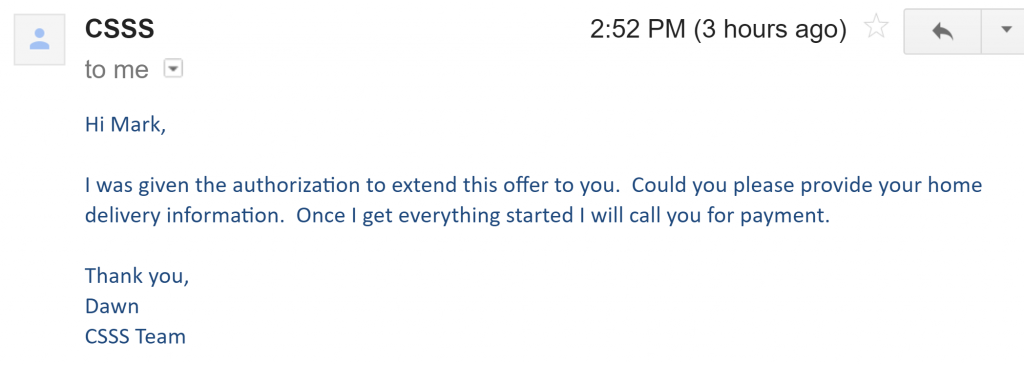There are times in marketing where the smallest mistake can have a massive reputational or financial impact on a company. I observed this myself today when I got this email from the Chicago Tribune. Note the subject line.
 What I saw was an offer of a year of digital access to the Chicago Tribune for $1.25. Seemed like a great deal to me, so I opened the email and read it. Imagine my surprise when I discovered that the Chicago Tribune missed a giant part of the offer in their subject line. Here’s the ENTIRE email:
What I saw was an offer of a year of digital access to the Chicago Tribune for $1.25. Seemed like a great deal to me, so I opened the email and read it. Imagine my surprise when I discovered that the Chicago Tribune missed a giant part of the offer in their subject line. Here’s the ENTIRE email:
The offer in the subject line wasn’t $1.25 for a year of digital access as it clearly said, it was $1.25 a week. That’s a whole different animal, but since the subject line with the offer of “Only $1.25 for one year of digital access” compelled me to open the email, I wanted (and using the business ethic that companies should honor their word) and expected to get the offer from the subject line. I mean, the theme of the email was the importance of truth and how bad fake news is, so shouldn’t the Tribune’s publisher tronc (yes, they use all lower case) honor their offer and treat the subject line as if it was indeed the truth? SOMEBODY had to approve the email, so SOMEBODY was accountable for the offer in the subject line going out.
Turns out the Chicago Tribune might not be as committed to truth, at least in the real world, as their marketing would lead one to believe. I called the number on the email to get the offer, and after half an hour and three people, an alleged supervisor with the name of “Kate” who would only tell me she was “offshore” told me I had to have a promo code to get an offer as good as $1.25 for a year of digital access, and as you can see by the email above, there is no promo code. So “Kate” told me she couldn’t help me and ended the call.
I thought it might be nice to talk with someone in the Tribune Tower, the home of the newspaper, so I called and asked for the head of circulation. I was told I couldn’t speak to that person. Then I asked for someone in the Publisher’s office. I was quizzed as to why I’d ever want to be connected with the Publisher and I explained my quandry. The very nice operator told me I couldn’t speak to the Publisher’s office either but would transfer me to a special Customer Service person who could help me.
I explained my request to “Dawn”, who I believe was actually in California and not Chicago, and she seemed dumbfounded that I would want the offer on the subject line of the email. But she finally agreed to look into it and get back to me. About an hour later, I received a promotional email from the Tribune’s sister paper, the Los Angeles Times. Check out the subject line on THIS message:
 Lookie, somebody added “a week” to the subject line. No more insinuation that the offer was for a full year because two simple words were added to the subject line. So all is well with the people who got the email from the LA Times, but what about the (probably) hundreds of thousands of people who got the Chicago Tribune email? We got a different offer in the subject line. Was the company going to stand behind it?
Lookie, somebody added “a week” to the subject line. No more insinuation that the offer was for a full year because two simple words were added to the subject line. So all is well with the people who got the email from the LA Times, but what about the (probably) hundreds of thousands of people who got the Chicago Tribune email? We got a different offer in the subject line. Was the company going to stand behind it?
 Almost three hours after the corrected subject line appeared on the LA Times email, I got the above email from “Dawn”. I replied and gave her the information she requested, now over four hours ago. I never heard back from her or anyone else at tronc.
Almost three hours after the corrected subject line appeared on the LA Times email, I got the above email from “Dawn”. I replied and gave her the information she requested, now over four hours ago. I never heard back from her or anyone else at tronc.
So what did we as marketers learn here? Quite a bit.
- Always proofread every word of an email, and get multiple people to proofread it as well. The same goes for any kind of content.
- Believe the customer when s/he catches the company making a mistake. Respond by not dismissing their story or giving them the run-around.
- Address the situation quickly and try to mitigate further damage. tronc did this by fixing the LA Times subject line.
- As Jay Baer said in his book “Hug Your Haters”, know that in the age of online communications, unsatisfied customers will tell their story often and they need to be taken care of quickly and efficiently, again to mitigate damage, but also to show your company cares about customer service.
- Finally, when you say you’re going to fix a problem, FIX IT. Do it fast, do it right, and do it fairly.
Marketers make mistakes. I don’t know if the Chicago Tribune intended to do a bait and switch with their subject line or if it was an honest mistake, I’ll probably never know. But I do know they only went about half way in trying to fix the problem they created. They updated the subject line for Los Angeles, and probably their other papers who hadn’t dropped the email yet. Eventually they promised me, in writing no less, that I could get a year of digital access for $1.25 because their email subject line said I could, but they never completed the transaction.
I wonder how many other people who got email with the $1.25 a year offer are going to get the deal. tronc will lose almost $60 on every person they have to give the $1.25 a year offer they sent in their subject line. Can YOUR business afford to take that kind of a hit because you were sloppy?

